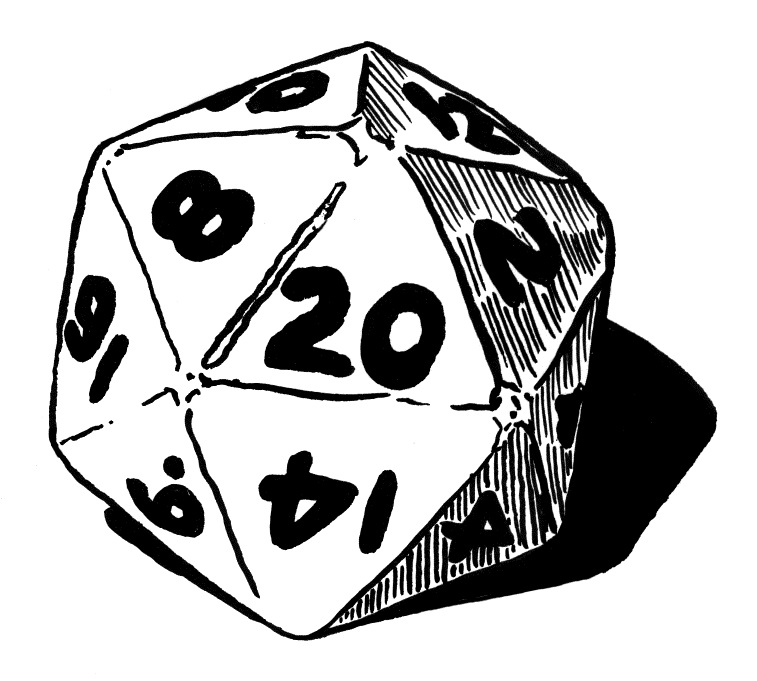I am curious what house rules people play with when the game. This is mostly aimed at the 5E crowd but I am still curious what changes people think are so necessary there are House rules added for them.
In 5E we always played with Drinking a Potion was a bonus action if you had it ‘on your belt’. Meaning everyone would have one potion they picked to be in a ‘ready’ state.
In 13th Age we allow a Potion to be drunk as a Quick Action if the player makes an Easy Save, on a fail they have to roll the save again on their next Quick Action.
In 5E we basically ignored Encumbrance and just made a judgement call is something was ‘too much’. (13th Age already does this in the rules)
I don’t tend to use a lot of house rules, and what I do are usually additive then changing some rule. In one of my Traveller games I added a Luck Point system, where if somebody rolled double ones on a skill check they got a Luck Point. Then after another skill check they could spend a point to reroll. You can’t spend more than one point on a roll, but more than one person can spend a point on a single skill check to reroll it again. It’s been great for player engagement, and has lead to some really fun moments as everybody scrambles to check if they have any points to spend on an important roll. Another one I use in my Traveller games is I added an Overwatch action. Inspired by the Xcom games, you can spend your action on your turn to keep your gun trained on a specific area, and if anybody moves through that area you get a free shot.
I also recently started playing Pathfinder 2e, and though in keeping it rules as written, especially as I learn the system, I have made it so that the party can only level up if they’re in Downtime mode, to encourage my players to actually make use of Downtime.
oh man, we had a ton of house rules. Let me see. We pretty much ignored the spell components entirely. For revivify, I (the cleric) just had to remove 100 gold from my inventory to bring someone back.
Later our games became a lot more narrative driven, and we had an agreement that character deaths would be largely avoided, unless agreed to by the player and the DM.
We never used XP and went with milestones for leveling.
We had a lot more, but it is 2 am and brain not cooperating >.<
I have never in all the decades I have played used the spell component rules. I used milestone levelling in my last 5E campaign, and its the default in 13th Age. Its just easier, and the PCs get more powerful when the story says they should.
Our group views TTRPGs as a way to experience a story or world. I know some people like to minmax or love rules and that’s great. But for us, while all worlds have rules, if the rules don’t lend themselves toward fun or progressing the story in a manner that makes sense, then I either adjust, change or don’t enforce them. I also will mix and match rules from different systems that I’ve enjoyed.
As for what rules, you already mentioned a few. We also utilize potions as a bonus action, but I don’t limit them. I do this because they like boss fights that include big hits and having the capability to heal helps ensure I’m not unfair during a fight.
We also utilize a karma system. I give out karma during sessions for excellent role play, ingenuity, making everyone laugh and for birthdays etc. They can then use this karma to buy certain enhancements from a genie prior to encounters. Enhancements include different things such as adding +1 to a die roll, rerolling, rolling with advantage, or even a long rest (super expensive). This has helped keep people engaged and gives some combat helpers that minimizes the impact when they are on a negative rolling streak.
undefined> too many set house rules, but I do make rule calls on the fly that don’t necessarily follow the handbooks, as I’m sure many DMs do. I am always aiming for rule of cool, and good for the story calls. In the end, we are here to have fun. If I make a call that gives the party an unintended advantage of a step up in some way, be damn sure I’ll make sure that gets balanced out somehow…
We’ve always played that healing potions can be consumed in a bonus action or an action to use one on an unconscious player.
I adapted the ‘Icon Relationships’ in 13th Age to be more like your Karma rule. It plays a little more FATE like. They get points, they spend points. Lets them get out of a touch scrape while giving them some agency
We forego all notions of hunting, rations, weight, in the end unless you aim for hyper realistic, common sense is good enough (hunting in a desert might be hard, transporting cargo is heavy.)
We modified a bit the rests mechanics: Short rest is short (like 5-10min) work as usual.
Full rest needs to be done in a safe camp or safe place, it means putting up a big fire and not having 2 persons on guard. Which means more dangers, (doing that near a bad guys place = fight for sure)
So we normally sleep without fires and it does replenish exhaustion, but no spell for the wizard (or all abilities that require full rest)
In the end it forces us to have the more balanced 4-6 encounter between long rest upon which d&d is built.
Works really well!
On a 5-foot grid, you can move two squares diagonally for 15 feet of movement, i.e. sqrt(2) = 1.5.
When there’s an ambush, the ambushee with the highest initiative repeatedly rolls initiative against a DC based on how good the ambush was, while the ambushers just take turns in whatever order they want. When the ambushee beats the roll, we set up a normal initiative order. Also, initiative is decoupled from dexterity – being good at turning cartwheels or picking pockets doesn’t mean you won’t freeze up in combat. Initiative is its own stat.
Most GMs I know will cherry-pick some of the better ideas from the different game systems they’ve run and bring them into new games.
In nearly every system I’ve run, I use the “re-roll initiative every round of combat” from Shadowrun as it doesn’t seem to interact negatively with most games, and it makes combat much less static.
I like that as a concept, it would definitely shake things up each round, but I feel like it would drag down the pace of combat. I try to avoid initiative calls wherever possible because I hate stopping to write down a bunch of numbers and shuffle them into descending order.
I don’t play with too too many set house rules, but I do make rule calls on the fly that don’t necessarily follow the handbooks, as I’m sure many DMs do. I am always aiming for rule of cool, and good for the story calls. In the end, we are here to have fun. If I make a call that gives the party an unintended advantage of a step up in some way, be damn sure I’ll make sure that gets balanced out somehow…
We’ve always played that healing potions can be consumed in a bonus action or an action to use one on an unconscious player.
We ignore rations, encumbrance, unless it really makes sense for it to be a problem. Our games are not gritty.
I play only with 2 PCs. My best friend who absolutely loves DnD and my wife, who has fun but isn’t as big on the game. So, fun is where it’s at for us. It makes for a chaotic game sometimes and i love it.
It depends on how tightly the system is designed. Pathfinder 2e players consider it blasphemy to houserule the way 5e players do, but the system is extremely well balanced so houserules aren’t really needed. In 5e there are so many holes in the system that basically every DM has to fill in the gaps to some extent.
As a PF2 player, we don’t consider it blasphemy, it’s just something that needs to be done carefully to avoid breaking things.
Plus, there is a clear pattern of people coming over from 5e, adding a bunch of houserules in their first playthrough, then complaining when things are broken. That behavior unfairly makes the system look bad.
Yeah maybe not “blasphemy”. It can absolutely be done well, but the mindset of houseruling in 2e is very different from the mindset of 5e houseruling. Like in 5e, the thing going through your head when you houserule is “the 5e rules don’t cover this situation appropriately so I need to try and come up with something that feels fair and in the spirit of the system design” whereas in 2e the system feels far more complete and has fewer holes.



